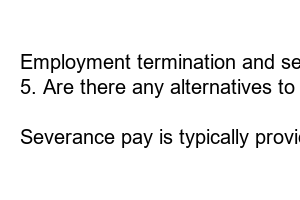퇴직금 조회
Title: Severance Pay Inquiry: Understanding Your Rights and Benefits
Introduction:
Considering the inevitable uncertainties in the corporate world, it is crucial to be knowledgeable about severance pay. Whether you are an employee approaching the end of your tenure or an employer looking to provide fair compensation, this blog post will help answer your inquiries and shed light on the often complex nature of severance pay.
1. What is Severance Pay?
Severance pay is a form of compensation provided by employers to employees who have been terminated, either due to layoffs, job elimination, or downsizing. It is intended to ease the transition period for the employee and mitigate the financial impact of sudden job loss.
2. How is Severance Pay Calculated?
Severance pay is typically calculated based on several factors, including the employee’s length of service, salary, and company policies. Each organization may have its own formula for determining severance pay, but it generally involves multiplying the number of years worked by a specific percentage of the employee’s salary.
3. What Does Severance Pay Include?
In addition to the base severance amount, other elements may be included in severance packages. These can comprise extended health benefits, continued access to company resources, outplacement services, and compensation for unused vacation days or sick leave accumulated during the employee’s tenure.
4. Are There Any Legal Obligations for Employers?
While severance pay is not a mandatory requirement under the law in many jurisdictions, employers often choose to provide it as a gesture of goodwill. However, there may be legal obligations in place, such as collective bargaining agreements, contracts, or labor regulations, which determine the severance entitlements for employees.
5. Can Severance Pay be Negotiated?
Yes, severance packages are often negotiable, especially for employees in higher positions or those with specialized skills. By engaging in open and honest communication with your employer, you may be able to negotiate enhanced severance benefits, payment terms, or additional perks to provide a more suitable financial cushion during your transition.
6. How Does Severance Pay Affect Unemployment Benefits?
In most cases, severance pay will have an impact on an individual’s eligibility for unemployment benefits. The amount of severance received is typically deducted from the weeks or dollar amount of unemployment benefits, depending on regional regulations. It is advisable to consult with local unemployment offices to understand the specifics applicable to your situation.
Summary:
Severance pay is a crucial element for both employees and employers during the termination process. Understanding the calculation methods, legal obligations, negotiation potential, and implications on other benefits ensures a smoother transition. By staying informed, individuals can better navigate their rights and leverage their severance package to secure financial stability and peace of mind.
FAQs:
1. How long do employers have to provide severance pay?
Employers usually provide severance pay immediately following termination or within a specified time frame as stated in employment contracts or agreements.
2. Do part-time employees qualify for severance pay?
Eligibility for severance pay may vary depending on factors such as employment duration, company policies, and local labor laws. Part-time employees may be entitled to severance pay if they meet certain criteria.
3. Is severance pay taxed?
Yes, severance pay is subject to taxation, similar to regular income. However, specific tax laws and regulations may differ, so it is wise to consult a tax advisor.
4. Can employees sue if they feel the severance pay is inadequate?
Employment termination and severance pay are subject to employment laws and contractual obligations. If an employee believes their severance pay is inadequate, they may consult an employment lawyer to explore their legal options.
5. Are there any alternatives to severance pay?
While severance pay is the most common form of compensation during termination, employers may offer alternatives such as extended health benefits or career counseling services.
6. Can an employee receive severance benefits if they resign?
Severance pay is typically provided in situations where an employee’s job is terminated involuntarily. However, there may be exceptions or special circumstances where an employer chooses to offer severance benefits to a resigning employee. This is usually addressed in employment contracts or negotiated individually.

